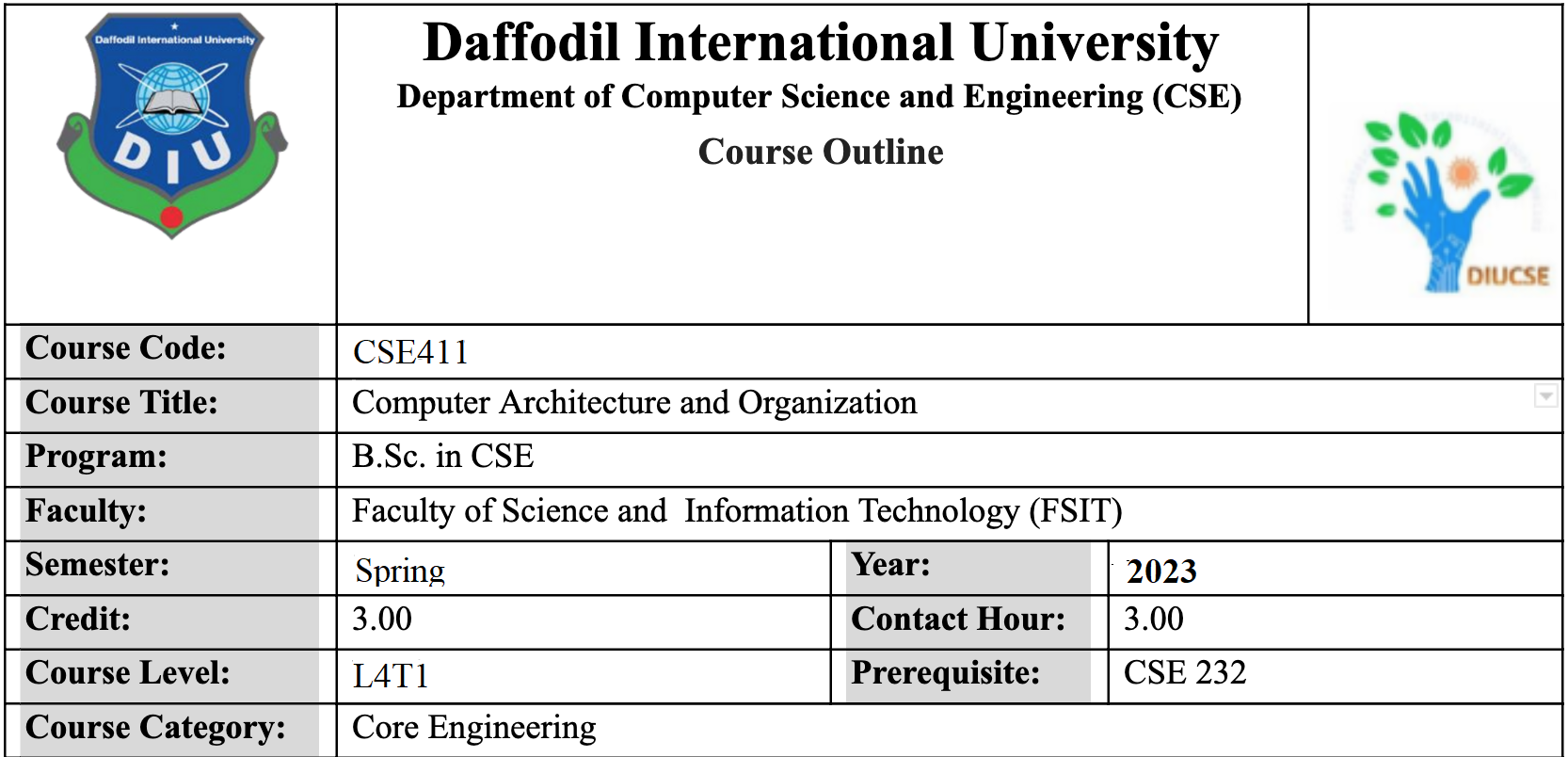To operate the Blended Learning Center(BLC) at optimal level, maintenance will be performed every day at 8:30 AM and at 5:00 PM regularly which can take up to 30 minutes. Please consider scheduling your activity in the BLC platform accordingly.
Topic outline
- Welcome to Computer Architecture and Organization

Welcome to Computer Architecture and Organization

Course Code: CSE335 || Credits: 3 || CIE Marks: 60 || SEE Marks: 40
🇨🇴🇺🇷🇸🇪 🇮🇳🇸🇹🇷🇺🇨🇹🇴🇷 🇮🇳🇫🇴🇷🇲🇦🇹🇮🇴🇳
Instructor Name : Tasmima Akter (TMA) Designation : Lecturer Office Address : Room-210, CSE Building, DIU Contact No : 01873703050 Email : uta5.cse@diu.edu.bd Whatsapp : Telegram : Appointment :  |
 |

The computer lies at the heart of computing. Without it most of the computing today would be a branch of theoretical mathematics. To be a professional in any field of computing today, one should not regard the computer as just a black box that executes programs by magic. All students of computing should acquire some understanding and appreciation of a computer system’s functional components, their characteristics, their performance, and their interactions. This course can help the students in this regard.
Course Objective
The objective is to enable the students to understand computer architecture in order to structure a program so that it runs more effectively on a real machine. Also, to provide an insight in selecting a system to use and to make them able
to understand the trade-off among various components such as CPU clock speed vs memory size.
Course Outcome(CO's)
CO1 Understand the internal working procedure of a computer system
CO2 Identify different components of a computer system
CO3 Compare between different generations of computer systems
CO4 Determine which hardware blocks and control lines are used for specific instructions
CO5 Detect pipeline hazards and identify possible solutions to those hazards
CO6 Show how to cache design parameters affect cache hit rate
CO7 Map a virtual address into a physical address
Course Outline
Presentation slides must follow this point:
- Title
- Introduction
- Description ( not mention in slide)
- Conclusion
- Reference
Please use maximum 8-10 slides.
Click for Presentation marking scheme 62_E presentation Slides Assignment
62_E presentation Slides Assignment
Restricted Not available unless: You belong to Section_62_E
 62_D presentation Slides Assignment
62_D presentation Slides Assignment
Restricted Not available unless: You belong to Section_62_D
- ATTENDANCE
- QUIZ
QUIZ
 62_D_Quiz4_Spring2024
62_D_Quiz4_Spring2024
Restricted Not available unless: You belong to Section_62_D
Date: 05-06-2024
time limit: 35
 62_E_Quiz4_Spring2024
62_E_Quiz4_Spring2024
Restricted Not available unless: You belong to Section_62_E
Date: 05-06-2024
time limit: 35
- ASSIGNMENT
ASSIGNMENT
 62_D_Assignment_spring2024
62_D_Assignment_spring2024
Restricted Not available unless: You belong to Section_62_D
 62_E_Assignment_spring2024
62_E_Assignment_spring2024
Restricted Not available unless: You belong to Section_62_E
- Week-1-- (Introduction and History of Computing)
Week-1-- (Introduction and History of Computing)
Topics of Discussion:
- The term Computer architecture & organization and differences between them.
- High-level structures & functions of computers.
- Evolution of computers, Performance evaluation of computing systems.
Expected Learning Outcomes:
- Identify the basics organization of a computing system.
- Differentiate between the concept of architecture and organization.
Resources of Learning:
- Week-2-- (Evolution of Computers)
Week-2-- (Evolution of Computers)
Topics of Discussion:
- The evolution of computers
- Mechanical computers
- Electrical computers
- Babbage's analytical engine
Expected Learning Outcomes:
- Identify the differences between electrical & mechanical computers
- Understand the structure of the analytical engine
- Understand the phases of computer evolution
Resources of Learning:
- Lesson 3: Comparison between electrical and mechanical computers. [Lecture 2]
- Lesson 4: Evolution of computers.
- Week-3-- (Design Methodology)
Week-3-- (Design Methodology)
Topics of Discussion:
- System representation and design process.
- Register and gate level design.
- Understand concepts of register transfer logic and types of microoperations.
- Processor level design and design logic circuits for different micro-operations.
Expected Learning Outcomes:
- Understand how to represent a computing system
- Learn how to design a system from basic level.
Resources of Learning:
- Week-4-- (Data Representation)
Week-4-- (Data Representation)
Topics of Discussion:
- System representation and design process.
- Register and gate-level design.
Expected Learning Outcomes:
- Introduction to system representation, behavior and function of systems, and design process.
- Learn different types of design processes and levels.
Resources of Learning:
- Week-5-- (Processor Basic)
Week-5-- (Processor Basic)
Topics of Discussion:
- Recognize the concept of instructions and instructions sets in modern computers.
- To know how various system in components are interconnected.
- Realize the importance bus plays in system
Expected Learning Outcomes:
- Recognize the concept of instructions and instructions sets in modern computers.
- To know how various system in components are interconnected.
- Realize the importance bus plays in system
Resources of Learning:
- Week-6-- (Data Representation and Encoding)
Week-6-- (Data Representation and Encoding)
Topics of Discussion:
- Computer data representation for numbers and characters.
- Computer numbers encoding.
Expected Learning Outcomes:
- Learn different computer numbers representation and conversion.
- Recognize the concept of encoding and data representation.
Resources of Learning:
- Lesson 11: Data representation and encoding. [PPT Lecture Slide]
- Lesson 12: Review on Mid Term Topics.
- Week-7 - (MID-TERM EXAM WEEK)
Week-7 - (MID-TERM EXAM WEEK)

Topics for Midterm Exam
- Introduction and Overview of the earliest computing tools.
- Mechanical vs Electronic computer.
- History of Computer and Evolution.
- Performance evaluation of computing systems.
- Design Methodology
- Data Representation
- Week-8-- (Processor Basics)
Week-8-- (Processor Basics)
Topics of Discussion:
- Instruction set characteristics
- Basic CPU design
- Processor Basics
Expected Learning Outcomes:
- Enhance the concept of instruction sets in modern computers.
- Identify the characteristics and functions of instruction sets.
Resources of Learning:
- Week-9-- (Processor Basics... Continuation)
Week-9-- (Processor Basics... Continuation)
Topics of Discussion:
- CPU design with ASM chart and Flowchart.
- Endian mode types.
- Discussion on Addressing modes with examples.
- Discussion on RISC and CISC processor.
Expected Learning Outcomes:
- Realize the concept of ASM chart & flowchart design of the CPU.
- Understand the Little and Big Endian modes and their purposes.
- Identify different Addressing modes, their types, and learn about their operation.
- Enhance the concept of processor functionalities.
Resources of Learning:
- Lesson 15: Continuation of Basic CPU design.
- Lesson 16: Addressing modes and types of operations.
- Week-10-- (Instruction Pipelining)
Week-10-- (Instruction Pipelining)
Topics of Discussion:
- Pipelining strategy and performance.
- Pipelining Timing diagram analysis with ideal & conditional or unconditional branching cases.
- Pipeline hazards and measures against pipeline hazards.
Expected Learning Outcomes:
- Realize the concept of instruction pipelining in modern computers.
- Appreciate the importance of pipelining in computer processing.
- Identify various pipeline hazards and their possible remedies.
Resources of Learning:
- Week-11-- (Cache Memory)
Week-11-- (Cache Memory)
Topics of Discussion:
- Concept of Cache Memory
- Memory hierarchy
- Cache Memory Mapping
- Replacement algorithm
Expected Learning Outcomes:
- Recognize the concept of cache memory in modern computers.
- Ability to differentiate the term Memory and Storage.
- Able to learn and identify the different cache memory mapping concept.
- Able to understand how the replacement algorithm works.
Resources of Learning:
- Week-12-- (Virtual Memory)
Week-12-- (Virtual Memory)
Topics of Discussion:
- Introducing the concept of Virtual Memory.
- Virtual Memory Mapping process and Address translation.
- Swap in and Swap out.
- Concept of Paging and page table.
Expected Learning Outcomes:
- A clear understanding of the working procedure of virtual memory.
- Able to understand how to address translation works.
- Learn the concept of paging and page tables.
Resources of Learning:
- Week-13-- (Presentation and Review Week)
Week-13-- (Presentation and Review Week)
Lesson 23: Presentation and Open-Ended discussion.
Lesson 24: Review of Final exam topics.
- Week-14 - (FINAL EXAM WEEK)
Week-14 - (FINAL EXAM WEEK)

Topics for Final Exam
- Processor Basics
- Instruction Pipelining
- Cache Memory
- Virtual Memory
- Topic 18
- Topic 19
- Topic 20